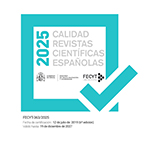Autenticidad, marca personal y agencia sexual: el posfeminismo lésbico en youtube
Resumen
Youtube, espacio mediático postelevisivo por excelencia, modifica los códigos de representación y comunicación entre jóvenes sobre temas como la identidad y la orientación sexual. Así, la plataforma de vídeo se ha convertido en el arma definitiva del activismo LGTBQ (Polo, 2016) donde gays, lesbianas, bisexuales y queers se abren paso en la red. Esto ocurre mientras el posfeminismo se consolida en los medios mainstream como lo que parece la única vía de representación femenina: ostentado en numerosas ocasiones por iconos de la cultura popular, el posfeminismo se caracteriza por un efecto ‘rebote’ contra el feminismo histórico, reivindicando una mujer liberada, asertiva y auténtica, obviando así las injusticias del patriarcado que siguen existiendo (Tasker y Negra, 2005; Gill, 2007). Los patrones de estas representaciones posfeministas están vinculadas por una parte con la autenticidad, el éxito, la libertad de elección y el empoderamiento femenino y, por otra parte, con la agencia sexual de las mujeres y el uso que éstas hacen de su cuerpo para conseguir privilegios.
Este estudio indaga en cómo las representaciones de youtubers lesbianas, por una parte, reproducen y, por otra parte, se resisten a este posfeminismo mainstream. Con este objetivo hemos seleccionado una muestra de cinco youtubers lesbianas españolas con un gran número de suscriptores (YellowMellow, Dulceida, Xuri Fenton, Gominuke, Koala Rabioso). Los resultados muestran, por un lado, la gestión del propio cuerpo principalmente situada fuera de la mirada masculina y generadora de nuevos imaginarios - en este caso, lésbicos. Esto otorga a las youtubers lesbianas una agencia sexual que no está enmarcada en el posfeminismo, sino que desarrolla su propio lenguaje. Por otro lado, estas youtubers ostentan una autenticidad más reflexiva (Giddens, 1994) y más comprometida que la de las representaciones posfeministas, generalmente vacías de contenido político. Aunque cada una de ellas crea una marca personal exitosa - más o menos vinculada a grandes marcas o el cosmetismo -, reclaman la autenticidad como valor principal y consiguen mantener una credibilidad a través de la gestión de sus fracasos en clave humorística.
Descargas
Descarga artículo
Licencia
La revista Investigaciones Feministas, para fomentar el intercambio global del conocimiento, facilita el acceso sin restricciones a sus contenidos desde el momento de su publicación en la presente edición electrónica, y por eso es una revista de acceso abierto. Los originales publicados en esta revista son propiedad de la Universidad Complutense de Madrid y es obligatorio citar su procedencia en cualquier reproducción total o parcial. Todos los contenidos se distribuyen bajo una licencia de uso y distribución Creative Commons Reconocimiento 4.0 (CC BY 4.0). Esta circunstancia ha de hacerse constar expresamente de esta forma cuando sea necesario. Puede consultar la versión informativa y el texto legal de la licencia.











